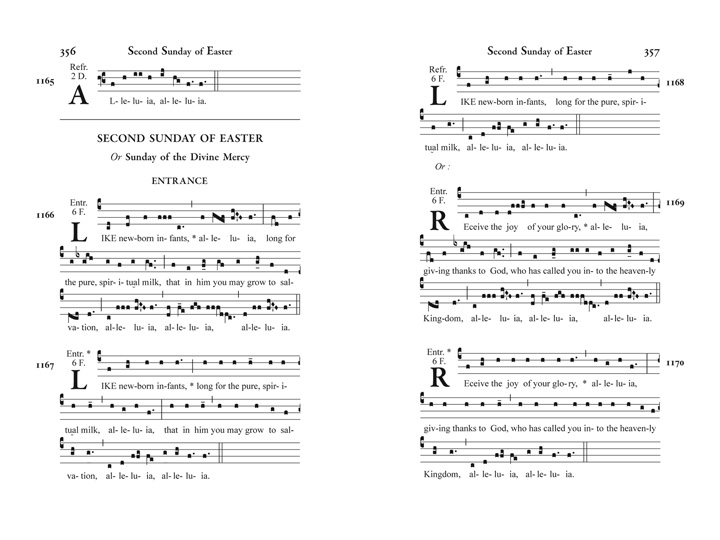Online Edition: May 2010
Vol. XVI, No. 3
Pentecost
Gradual Progress in Recovery of Sacred Music
The Saint Louis Gradual — English Chants for the Roman Missal

by Helen Hull Hitchcock
The Roman Gradual (Graduale Romanum) is the official book of liturgical music for Mass. It contains all the plain-song (chant) music for the Ordinary of the Mass (Ordinarium Missae, or Kyriale) as well as all the Propers for the entire liturgical year.
A word of explanation. The name “Gradual” comes from the most ancient and important psalm chant that was sung between the Epistle and the Gospel — comparable to the Responsorial Psalm in the present Roman Missal. This Gradual chant was part of the Proper of the Mass — that is, the texts for Mass that change according to the feast or season of the liturgical year. The other three Proper chants of the Mass, the Introit, Offertory, and Communion, were introduced later, and are usually verses from psalms or other Scripture texts. The fixed texts that do not vary, such as the Kyrie (Lord, have mercy), the Gloria, Credo, Agnus Dei (Lamb of God), etc., are known as the Ordinary of the Mass.
Efforts to Encourage Chant in Parishes
In 1908, the Graduale Romanum was compiled from ancient sources and approved for publication by the Vatican. Following the Second Vatican Council, a new official version of the Graduale Romanum was published in Latin in 1974 by the Benedictine monks of Solesmes, France.
By the time the updated Graduale Romanum appeared, the vernacular had been used at Mass for a decade, and new music in the contemporary style had effectively supplanted chant — even though the Council had stressed the importance of Gregorian chant in the celebration of Mass. The Propers of the Mass were rarely sung.
In the same year that the Graduale Romanum was published, Pope Paul VI, recognizing that chant had virtually disappeared, made an effort to encourage the singing of chant at Mass by publishing Jubilate Deo, a booklet of basic Latin chants and hymns. Jubilate Deo provided a “minimum repertoire of Gregorian chant” — an official Latin “core repertoire” for the Roman Rite. It was prepared, the pope said, in order “to make it easier for Christians to achieve unity and spiritual harmony with their brothers and with the living tradition of the past. Hence it is that those who are trying to improve the quality of congregational singing cannot refuse Gregorian chant the place which is due to it” (Voluntati Obsequens).
In April 1974, Pope Paul sent a copy of the Jubilate Deo booklet to every bishop in the world. But his effort did not succeed in restoring chant to the Church’s musical vocabulary.
An expanded edition of the Jubilate Deo produced by the Congregation for Divine Worship in 1987 was similarly ignored. Translating the contents of the entire Graduale Romanum collection of chants — or even the Propers of the Mass — into English was not on the radar screen. The Church’s ancient heritage of sacred music that the Second Vatican Council expressly wished to maintain seemed doomed to oblivion. Any hope that the chants of the Mass might ever be sung by an ordinary Catholic congregation seemed utterly futile.
During the past fifteen years, however, there has been a revival of interest in Gregorian chant in the celebration of Mass, as part of renewed efforts to recover a sense of sacredness and reverence. The Adoremus Hymnal, when it appeared in 1997, was an early sign of renewed interest in sacred music and chant. Since then, there have been other promising developments in liturgical music (as often reported in these pages).
The Saint Louis Gradual
Among the most recent signs of this rather dramatic revival now in progress is the Saint Louis Gradual, which is in the final stages of preparation.
The Saint Louis Gradual provides English chant settings for the newly approved English texts of the Roman Missal. It is the work of Benedictine Father Samuel Weber, director of the Institute of Sacred Music of the Archdiocese of Saint Louis, established in 2007 by Archbishop Raymond Burke, who gave the project its initial impetus.
Father Weber has also prepared a Saint Louis Hymnal for the Hours, to be published in August 2010. He will be a featured speaker at the international conference on sacred music to be held this summer in Ireland. (See AB April, p. 2).
The Saint Louis Gradual contains
• All the Propers of the Mass given in the Roman Missal (Introits, chants after the readings, Offertories and Communions) for the entire liturgical year in English.
• A selection of settings in Latin and in English of the Ordinary (Common) of the Mass (Kyrie, Gloria, etc.)
• The Simple Gradual (Graduale Simplex), simpler chant settings that may be used for most Sundays of the liturgical year, as well as for major solemnities and feasts
• A selection of supplementary chants that might be used at Mass as motets or hymns, e.g., Adoro te devote, Ave verum Corpus, Pange lingua.
• The Sequences: Victimi Paschali, Easter; Veni Sancte Spiritus, Pentecost (also Lauda Sion, optional for Corpus Christi; the Marian sequence, Stabat Mater; and the Dies Irae for Requiem Masses and All Souls.)
The chant settings in the Saint Louis Gradual will be given in three forms: easy, more complex, and very simple refrains. It will include complete organ accompaniments in low, medium and high keys. An accompanying cantor book will contain all the psalms verses in their proper tones needed by the cantor.
The web site of the Institute of Sacred Music affords examples of the contents: http://archstl.org/worship/page/institute-sacred-music.
For further information about the Saint Louis Gradual (or the Saint Louis Hymnal for the Hours), contact Father Samuel Weber, OSB, Institute of Sacred Music, Archdiocese of St. Louis, 5200 Glennon Drive, St. Louis, MO 63119-4330.
E-mail: [email protected].
***
*



